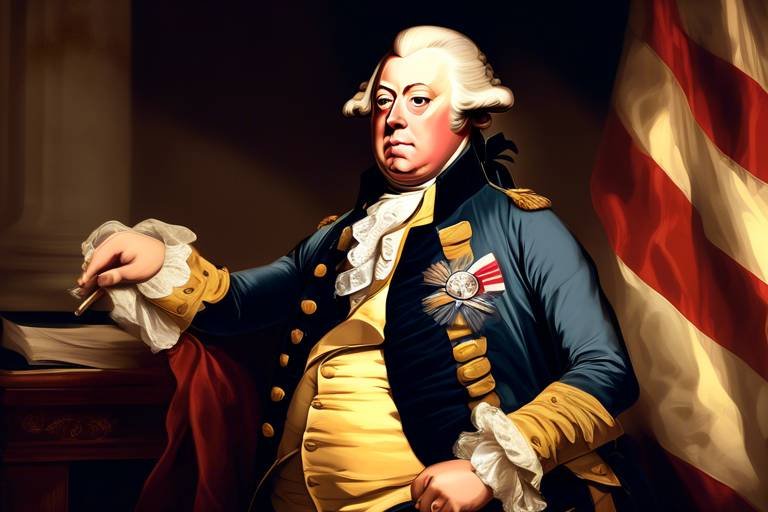Alfred the Great: The King Who Defended England
Alfred the Great, known as the King Who Defended England, was a remarkable leader whose legacy continues to shape the history of the nation. Born in the late 9th century, Alfred's early life and education played a crucial role in shaping his reign as a defender of England. Growing up in a time of turmoil and Viking invasions, Alfred was exposed to the harsh realities of warfare and the importance of safeguarding his kingdom.

Early Life and Education
Alfred the Great, known for his remarkable defense of England, was shaped by a unique upbringing and educational background that laid the foundation for his reign as a visionary leader. Born in 849 AD, Alfred was the youngest son of King Æthelwulf of Wessex. Despite being the youngest, he displayed intelligence and curiosity from a young age, showing a keen interest in literature and the arts.
Alfred's education was greatly influenced by his mother Osburh, who instilled in him a love for learning and a deep sense of duty towards his kingdom. Under the guidance of his tutors, Alfred delved into the study of Latin, philosophy, and history, gaining a broad understanding of the world beyond Wessex. His early exposure to a wide range of subjects would later prove invaluable in his efforts to defend England against external threats.
As Alfred ascended to the throne in 871 AD, following the death of his brother King Æthelred, his educational background played a crucial role in shaping his strategic approach to governance and defense. His commitment to learning and intellectual pursuits set him apart as a king who valued knowledge and innovation in the face of adversity.

Struggles Against Viking Invasions
During his reign, Alfred the Great faced numerous challenges in defending England against relentless Viking invasions. These invasions posed a significant threat to the stability and sovereignty of the Anglo-Saxon kingdom, prompting Alfred to devise strategic responses to repel the Viking forces.
Alfred's struggles against the Viking invasions were characterized by a series of fierce battles and tactical maneuvers aimed at safeguarding his kingdom. The Viking raids, marked by their ferocity and plundering nature, tested Alfred's military prowess and leadership skills to the fullest.
One of the most notable confrontations during Alfred's reign was the Battle of Edington, a decisive clash that ultimately turned the tide against the Viking invaders. In this pivotal battle, Alfred's forces successfully defeated the Viking army, securing a crucial victory that bolstered England's defenses and morale.
Throughout his reign, Alfred implemented innovative defensive strategies to counter the Viking threat, including the construction of fortified strongholds and the organization of a well-trained militia. These measures played a vital role in repelling further Viking incursions and safeguarding the realm from external aggression.
Alfred's relentless efforts in defending England against Viking invasions not only secured his legacy as a formidable warrior king but also laid the foundation for the future defense of the kingdom against external threats. His strategic acumen and unwavering determination in the face of adversity solidified his reputation as a legendary figure in English history.

The Battle of Edington
The Battle of Edington was a pivotal moment in Alfred the Great's reign as the defender of England. This historic battle took place in the year 878, when Alfred faced a formidable Viking army led by Guthrum. The conflict arose as the Vikings sought to expand their territory and dominance over the Anglo-Saxon kingdoms. Alfred, known for his strategic brilliance and determination, prepared his forces for a decisive confrontation that would shape the future of England.
As the two armies clashed on the battlefield, the ferocity of the fighting was matched only by the stakes at hand. Alfred's forces, though outnumbered, displayed remarkable courage and discipline in the face of the Viking onslaught. The Battle of Edington was not just a clash of arms, but a test of wills between two determined leaders vying for control over the land.
Alfred's tactical acumen came to the fore during the intense fighting, as he maneuvered his troops with precision and exploited the weaknesses in the Viking army's formations. The Anglo-Saxon shield wall, a hallmark of Alfred's defensive strategy, proved to be a formidable obstacle for the Viking invaders, who found themselves unable to break through the resolute English defenses.
After a fierce and protracted struggle, Alfred emerged victorious at the Battle of Edington, dealing a significant blow to the Viking forces and securing a crucial triumph for the defense of England. The defeat of Guthrum and his army marked a turning point in the conflict, demonstrating Alfred's resilience and leadership in the face of adversity.
The aftermath of the Battle of Edington saw Alfred consolidating his gains and fortifying his defenses against future incursions. The victory not only bolstered Alfred's reputation as a warrior king but also instilled a sense of confidence and unity among the Anglo-Saxon populace, who rallied behind their sovereign in the defense of their homeland.

Legal and Military Reforms
Alfred the Great, known for his valor and strategic brilliance, implemented significant legal and military reforms that fortified England's defenses during his reign. His reforms were crucial in safeguarding the realm against external threats and internal discord. Alfred understood the importance of a well-organized legal system and a robust military structure to maintain stability and protect his kingdom.
One of Alfred's most notable contributions was the establishment of the Burghal System, a network of fortified towns and strongholds strategically positioned across the kingdom. These burhs served as defensive hubs, providing protection to local communities and acting as centers for military coordination and response. The Burghal System effectively deterred invasions and enabled rapid mobilization of forces in times of crisis.
In addition to fortifications, Alfred introduced reforms to the military organization and training. He emphasized the importance of a well-trained and disciplined army capable of repelling Viking incursions. Alfred implemented a system of compulsory military service known as the fyrd, which required all able-bodied men to undergo training and be ready for combat when called upon.
Furthermore, Alfred focused on improving the legal framework of the kingdom to ensure justice and order prevailed. He established a unified code of laws based on existing Anglo-Saxon customs and Christian principles. These laws promoted fairness, punished wrongdoers, and upheld the rights of all subjects under the rule of law.
Alfred's legal and military reforms not only strengthened England's defense but also fostered a sense of unity and resilience among his people. By investing in the protection of his realm and the well-being of his subjects, Alfred set a precedent for future rulers to prioritize the security and prosperity of the kingdom above all else.

The Burghal System
The Burghal System was a strategic network of fortified settlements established by Alfred the Great to defend England against Viking invasions during the 9th century. These burhs, or fortified towns, were strategically positioned across the kingdom to provide protection and serve as centers for defense and administration. Each burh was equipped with walls, gates, and garrisons to safeguard the local population and resources from Viking attacks.
Alfred's Burghal System was a revolutionary approach to defense, marking a significant shift from the traditional reactive response to invasions. By proactively constructing fortified towns and maintaining a standing army, Alfred aimed to deter Viking incursions and ensure the security of his realm. The strategic placement of burhs along rivers, coastlines, and key transportation routes allowed for swift communication and reinforcement in times of need.
Furthermore, the Burghal System not only served a military purpose but also facilitated economic growth and urban development. The presence of fortified towns encouraged trade and commerce, fostering a sense of stability and prosperity within the kingdom. The burhs became centers of craftsmanship, agriculture, and governance, contributing to the overall resilience of Alfred's realm.
Alfred's innovative approach to defense through the Burghal System laid the foundation for future fortification strategies in England and influenced the development of medieval towns and cities. The legacy of these fortified settlements endures in the landscape of England, serving as a testament to Alfred the Great's enduring legacy as a visionary leader and defender of the realm.

Cultural and Educational Legacy
Alfred the Great's reign left a profound mark on English culture and education, shaping the foundations of both realms for generations to come. His commitment to learning and literacy was instrumental in revitalizing intellectual pursuits in a time of turmoil and uncertainty. By promoting the translation of key texts from Latin to English, Alfred democratized knowledge and made it accessible to a wider audience, fostering a cultural renaissance that resonates to this day.
Moreover, Alfred's emphasis on education extended beyond mere translation efforts. He established a court school where not only the nobility but also promising commoners could receive an education. This inclusive approach to learning laid the groundwork for a more educated populace, fostering innovation and progress in various fields. Alfred's legacy as a patron of education continues to inspire a thirst for knowledge and intellectual curiosity in modern society.

The Translation Movement
During Alfred the Great's reign, one of his most significant contributions was the Translation Movement, a pivotal initiative that aimed to make important texts accessible to the English population. This movement involved the translation of key works from Latin into English, allowing a broader audience to engage with literature, philosophy, and religious texts. By promoting the translation of these materials, Alfred fostered a culture of learning and knowledge dissemination that laid the foundation for intellectual growth in England.
Alfred's patronage of the Translation Movement not only facilitated the spread of knowledge but also played a crucial role in preserving cultural heritage. By making these texts available in English, Alfred ensured that the wisdom contained within them could be passed down through generations, enriching the cultural landscape of England. This emphasis on translation as a means of preserving and sharing knowledge highlights Alfred's commitment to education and intellectual development.

Legacy and Historical Impact
Alfred the Great's legacy and historical impact are deeply intertwined with the defense of England and the shaping of its historical narrative. His reign as a defender of the realm left an indelible mark on the course of English history, earning him the epithet "the Great" for his remarkable achievements.
One of Alfred's most significant contributions was his steadfast defense against Viking invasions, which threatened the very fabric of England. Through his strategic military prowess and unwavering determination, he successfully repelled numerous Viking attacks, securing the safety and sovereignty of his kingdom.
Moreover, Alfred's establishment of legal and military reforms laid the foundation for a more organized and efficient defense system in England. The implementation of the Burghal System, a network of fortified towns and strongholds, bolstered the country's defenses and ensured better protection against external threats.
Alfred's cultural and educational legacy also played a pivotal role in shaping England's future. Under his patronage, a translation movement was initiated, bringing important texts into English and fostering a rich literary tradition that would endure for centuries.
Assessing Alfred the Great's historical impact reveals a legacy that transcends time. His contributions to the defense of England and the advancement of its cultural and educational landscape continue to resonate in modern times, underscoring his enduring significance in the annals of history.
Alfred the Great's legacy is not merely a chapter in history books but a living testament to the power of resilience, leadership, and unwavering dedication to the defense of one's homeland. His historical impact serves as a beacon of inspiration for generations to come, reminding us of the enduring legacy of a king who defended England with unmatched valor and determination.

Modern Reverence and Commemoration
Modern Reverence and Commemoration of Alfred the Great are deeply ingrained in English history and culture. His legacy as the defender of England continues to be honored through various means, showcasing the enduring impact he had on the nation.
One prominent way in which Alfred the Great is commemorated is through statues and monuments erected in his honor across England. These physical tributes serve as a reminder of his valiant efforts in protecting the realm from Viking invasions and his significant contributions to the defense of the country.
Furthermore, Alfred's legacy is celebrated through annual events and ceremonies that highlight his achievements and the pivotal role he played in shaping the course of English history. These gatherings bring together historians, scholars, and admirers of Alfred to pay homage to his memory and ensure that his legacy endures through the ages.
In addition to tangible commemorations, Alfred the Great is also revered through literary works, documentaries, and educational programs that explore his life and accomplishments. These mediums help to educate the public about his leadership, resilience, and unwavering dedication to the defense of England, ensuring that his story is not forgotten.
Moreover, modern scholars and historians continue to study Alfred the Great's reign, seeking to uncover new insights into his strategies, reforms, and impact on English society. By delving into his legacy, they aim to shed light on the complexities of his rule and the enduring influence he had on the development of the nation.
Overall, the modern reverence and commemoration of Alfred the Great serve as a testament to his enduring legacy as a defender of England. Through various forms of tribute and recognition, his contributions to the nation's history and culture are celebrated and honored, ensuring that his name will be remembered for generations to come.
Frequently Asked Questions
- Who was Alfred the Great?
Alfred the Great was a 9th-century king of Wessex who is renowned for his defense of England against Viking invasions and his contributions to legal, military, and cultural reforms.
- What were Alfred the Great's major accomplishments?
Alfred the Great is known for his successful defense against Viking invasions, the establishment of the Burghal System for defense, the promotion of education and culture through the Translation Movement, and his lasting impact on English history.
- How did Alfred the Great defend England against Viking invasions?
Alfred employed various strategies such as fortifying towns through the Burghal System, organizing a well-trained army, and engaging in decisive battles like the Battle of Edington to repel Viking forces.
- What was the Burghal System?
The Burghal System was a network of fortified towns and strongholds established by Alfred the Great to defend against Viking attacks, showcasing his innovative approach to military defense.
- What is Alfred the Great's legacy?
Alfred the Great's legacy includes his significant impact on English law, education, and culture, as well as his enduring reputation as a defender of England and a symbol of national pride.



















